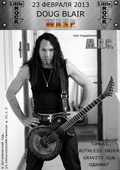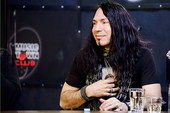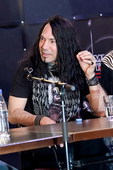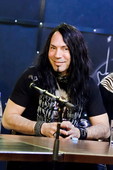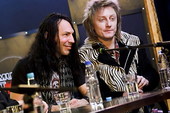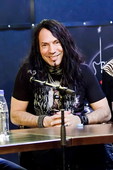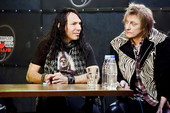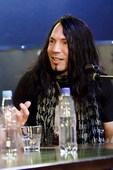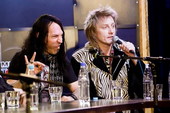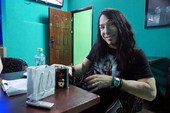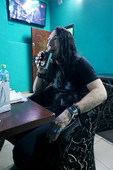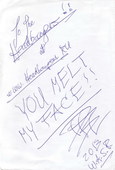Doug Blair
Fighting Mental Illness
11.04.2013
Архив интервью | Русская версия“What!? Are those the guys who eat worms on stage?” That was how all my friends responded when I told them about an interview appointment with Doug Blair, the guitar player for W.A.S.P. Stereotypes die hard; it doesn’t matter that the band ran out of worms quite a while ago, or that Blackie Lawless's got a beer belly and does not hurl raw meat into the audience anymore (not to mention that Doug Blair himself joined the band as late as 2006). So if the first thing that comes to your mind when hearing about W.A.S.P. is a couple of hairy half-naked dudes dismembering a young virgin’s body with a chainsaw, I have to assure (or maybe disappoint) you. Doug Blair is not like this at all.
Doug is always sharply dressed and he looks surprisingly young for his 50 years of age. “I made a deal with the devil”, he laughs when asked how he manages to achieve that. “Had to sell my soul, so it goes”. Doug is always smiling, patting you on your shoulder and paying compliments. And he didn’t touch alcohol all day long.
I was given no more than an hour for the interview (and Doug was going to have a snack during this time), after which the guitarist was supposed to have a “meet & greet” with fans and do two shows with M.R.C. (Moscow Rock City), a Moscow-based cover band that invited Doug to Russia.
- Isn’t it a bit too much for one day?
- It is! – Doug agrees willingly, laughs and points at Paul Potapov, M.R.C. vocalist. – You have to tell him!
Paul is sitting right there so there is no need to tell him anything. He is the one who put the schedule together, but he doesn’t take those complaints too seriously. The two have known each other for quite a while, so they just continue on joking.
- If I lived in a city with the traffic like in Moscow, I would have a helicopter!
- Well, the flights above the city are kinda forbidden.
- Oh, I’d have an invisible helicopter in this case!
Finally, the dishes are put aside and Doug says I can have him at my disposal. Not for a long time, unfortunately.
So, how do you like it in Moscow?
It’s super-extreme. There is this chaotic insane driving, totally mental traffic… But I’ve always been super impressed by the massiveness of Moscow, by this kind of majesty, the power that seems to come from the very ground. Because the buildings are so… impressive (looking for the right word)…
Monumental?
Yeah, monumental is a great word for it. Boston, the city where I live, isn’t very big. We’ve only got a few big buildings. Of course New York isn’t that far away, and it is really impressive in the same way but everything there is squeezed together and you can’t actually see the buildings. I have my favorite buildings in New York and I can stand right at the bottom of them, look up and go, “Oh, what an awesome building!” But you can’t get far enough away from it to see how really cool it is. So when I come to Moscow I’m impressed when I get to see really, really large buildings as we drive past them or even far away from them. It’s like: “Wow, look at this giant building!” I mean one of the Seven Sisters or other new buildings, they just look like they are in the outer space or something. Because around them – it’s flat, it’s low, there is space that they can rise from. So I really like that about Moscow, but being on the ground is a lot tougher… We were talking about it. The congestion, the population… It’s just so many cars and so many people going everywhere! But I love it as it is. The people are great here and the music scene is cool, so we love to come here.
Did you come yesterday?
Yes, about the lunchtime.
What did you do last evening?
We rehearsed. Or we sat in traffic – that’s what we did actually. (smiles) We sat in a lot of traffic to get to the hotel and then we sat in a lot of traffic as we came here to eat, and then we sat in a lot of traffic getting to the rehearsal place. So we spent most of the day looking at Moscow from inside the car. But we had a good rehearsal; we went through all the songs and everything and made sure it sounds good.
How did you get to know the guys from M.R.C.?
We had met Paul when W.A.S.P. played here but I’m not sure if I personally spoke with him. Somehow I was referred to Paul by a friend of mine, a mutual friend of ours, when I was trying to find different magazines to send some information to and get articles about my guitars. So Paul said he was interested in doing a little article featuring the guitars for “Classic Rock”. Apparently they had a section that’s kinda about the equipment. So I wrote about my guitars and sent him some pictures, he did a great interview end everything looked really cool. And after that I had somehow stumbled upon the fact that Chris Holmes (ex-guitarist of W.A.S.P.) came here. I think I saw a poster saying that Chris had come to play with some guys in Moscow and I thought, “That’s really cool! I wanna do that!” But I didn’t know that Paul was the one who put it together. So somewhere along the way I found out that Paul was the guy who got Chris Holmes and Ryan Roxie (ex-guitarist of Alice Cooper) and other guys from America, from Sweden, from other countries to come to Moscow, to stay for a few days and jam and have a good time here. So that’s how I came across Paul and how it got together.
Do you like the M.R.C. band?
I do. I’ve only heard them last night, but yes, they’re very good.
Which of your guitars did you bring with you?
I’ve only been able to bring two of my guitars ‘cause the airfares for bringing guitars on short domestic flights are so high. So I brought two my best guitars. First, the Double Neck guitar that I built in 1990. That’s super-special. I call it Blair Mutant Twin, meaning it’s a twin, it’s double necked, but it’s a mutant, too. It’s not like a normal double neck with 12 strings on the top and 6 on the bottom. No, it’s acoustic on the top and electric on the bottom. I’ll play that a little bit though I was hoping we could find more songs that I can use it for. But I wanted to bring it anyway ‘cause it’s really, really cool. And the other guitar is my number one guitar with W.A.S.P. It’s just a Les Paul with the spinning gold blade on it. I’d like that to be kind of my signature guitar. The saw blade is kind of a logo, you know. I mean the real saw blade is great, but even if it is fake, kind of cosmetic that looks like a saw blade, even painted on the guitar it’s still pretty cool. Actually I wanna paint a 3D saw blade on it, so when the guitar moves a little bit it looks like it’s spinning. I think that’s not very difficult now. Have you seen the CD covers that have different images when you move them?
Yeah.
So it’s the same technology. It’s just using different prisms, so I’m gonna try it. ‘Cause then it won't have to have a motor, and something that cuts your fingers, and it'll still look like it's spinning around. But we’ll see. I like the real spinning around one, it’s fun.
Aren’t you afraid to lose one of your fingers?
No, but I’ve got some cuts. The blade on the red guitar that I’ve brought isn’t very sharp, but the other guitar, the first one that I put a saw blade on, it had a real saw blade and there was no way to dull it ‘cause that was a super-duper hard steel from the 1950s. So it got you. If you were not really careful… (whistles) you got a little slice there so I got cut up a few times with that one. And if I had to defend myself against some crazy guy… (imitates having a chain saw in his hands) cut the scull right open. (both laughing)
When did you start to modify guitars?
Oh, boy... My first guitar ever was my father’s guitar from the army. The model is called Silvertone, it’s a really old common guitar that could be bought in any department store. You can ask so many guitar players about their first guitar, and they’ll say, “Oh, it was a Silvertone”. It was really common in the 1960s, it was just cheap. So we had a Silvertone at home. When I started learning how to play… You know, I liked my guitar, but the really expensive brand was Martin which is still one of the best acoustic guitars. So I took sand papers, sanded my guitar down and wrote Martin on it. (smiles) And I still have it! I wrote a really nice Martin, sanded the top a little bit and drew my own nice lines around the edge. I actually made it fancier. With magic markers! (both laughing) I think I was about 11 or 12 when I did that. And now I look back and go, “Yeah, that’s where it began”. I always wanted to take what was normal and just go, “Ok, we can change this a little bit, we can fix that….” I never was afraid to ruin the guitar.
Has it ever happened?
No, I don’t think I’ve ever truly ruined one. But of course sometimes it didn’t come out as good as I thought. I also started building guitars pretty early. We could build guitars in school, we had those classes where you could work with wood. We would get a piece of wood and just sand it or whatever until it was kinda like a guitar. So it was pretty early, too.
Why are you still doing this? Do you enjoy it or maybe you just can’t find the stuff you want in the store?
That’s right, no company makes this sort of stuff and tries to sell it ‘cause there wouldn’t be enough people that really would wanna buy it. So you’re right. If you are only gonna buy what’s available on the market, you’ll only get pretty normal stuff. I mean maybe you can get a fancy paintjob, or a guitar with custom this or that but… But for the most part if anything is made to be sold on the market and - hopefully - to be sold in quantity, which means thousands of them, they’re not gonna do any really, really weird things that only one or two guys might want. So the reason to do it is because you cannot find this stuff in the store, you have to make it yourself.
Has any guitar company offered you to be their endorser?
Not really, ‘cause the guitar companies are mainly concerned with making lots of money. Much like record labels are. So as difficult as it is for a non-commercial, very eccentric or very odd, very unique musical project to be asked to sign a record deal with a big record label, it’s just as rare for somebody who builds very interesting but weird instruments to have a big company coming to them and suggesting, “Oh, this is great, we want you to play our guitars and you can fix our guitars up”. But I worked for some really cool guitar companies where my Double Neck work actually got me the job. That’s who they wanted, they wanted to find a guy who built weird guitars and had good ideas and wasn’t afraid to take the risk. And that’s why I went to work for that company on a very, very weird and risky guitar…
Have you ever thought about starting your own guitar company?
Yes, I have started one when I built the Mutant Twin. I built two prototypes and then I built maybe 15 more. I sold maybe 10 of them which is cool ‘cause they are pretty expensive. So I was able to sale enough to pay what I put into getting it going. But then I realized I need to be playing guitars, not building them and I got back to playing. So I don’t have a company and if I tried to start it now I wouldn’t have any time to play. It’s also fun to build and design guitars, but if you get really wrapped up in having a company, you will not have any time for anything beyond it.
Does it happen that somebody really wants to buy one of your guitars?
Yes, and the Double Neck is the one I could sell them. Not the Guitar Cross, which I didn’t make any more. But I did give it to my hero, his name is Devin Townsend, he is a super-duper producer and musician. He really liked the Guitar Cross. I let him borrow it and the first thing he did is he wrote a really cool song on it and put it on his record. I think I wrote about it on my web-site but I haven’t provided a link yet. He’s actually the only other guy who decided to do something with this. And that’s the key, if I could find more guys… I don’t know, any band who is a little bit progressive like that, who are interested in getting something more going. They would take it. One of the biggest potentials for Guitar Cross would be in a band that only has one guitar player. So I wish I could make 25 of those instruments and give them to some of the coolest bass players who already play really cool bass in their bands. And they’d say, “Wow! Look what I can add to the band now!” And the guitar player would go, “Wow! Look at all the sound he can make now!” Not that you need it all the time, but during some different parts of the songs the bass player can add these really nice guitar sounds. Just like there’s another guitar player.
As far as I know, you’ve been giving lessons for quite a while.
Yes, I taught guitar lessons for years and years, but privately. I see the students one by one. I’ve written a lot of articles for magazines about some topics that a guitarist would be concerned with. They are written about endorsement, which means you kind of join a company to use their equipment, but in turn you have to promote it. I’ve written about touring, about constantly trying to learn, no matter how old you are. That’s what the real fun part about the guitar process: now I have something really new to learn, something that makes you wake up early and just get to it. ‘Cause when you play guitar for a super-long time, there isn’t so much left to do.
I assume many of young guitar players might read this interview. In your opinion, what are the main mistakes that most of the beginners do?
Wow, that’s a tough question. Let me see… Not practicing – that’s the main mistake. If they’re young and they’re practicing, almost everything they do is right. So I would say the main mistake is not taking this as serious as they should, not giving it as much time as they should. I can suggest a lot of right things to do which are to practice all the time, to forget about the girls (smiles), forget about money... If you’re gonna stick with music, of course, you need some sort of backup, something you can do to make money while you are creating music. That’s what your parents are gonna tell you. Everybody’s gonna tell you that – try to get a good education in something so as if the music doesn’t work out, you’ll be OK. And if the music is going out but not as good as you want it to, you’ll still be able to keep on going. One of the best stories that I can give you is one of my good friend. He wasn’t my student, but he’s a very good friend of my ex-girlfriend and he would come to our house all the time and I would fix his guitar and we’d play a little bit… His name is Mike Mushok, he’s the guitarist in the band Staind. He worked really hard in this band, he even asked my ex to sing on some of their songs. I know he wanted to become famous, to get somewhere, but he stayed in college. Mike is very smart, he got an engineering degree and went to work as an engineer. I actually helped him before he graduated from the college. You know how the students need to do an internship? You have to go to a company and sort of work. I helped him to get to a guitar company, ‘cause I know the people there. So he went to the guitar company and did this two- month internship where he worked as an engineer on the guitars which must be the coolest! He loved that. Then he graduated from college and went to work in Boston, had this regular job but he still kept going with the band. One day he gave a cassette tape to the keyboard player of the band called Limp Bizkit and said “Hey, check out my band”.
How did he manage to do that?
He just went to the show, he didn’t know them. So they took the cassette and listened to it… They called Mike back two hours later and said, “We’re in the bus right now and we’re listening to your band. It’s really good, we wanna talk to you”. Now Staind is famous, they’ve done many records. He made a hundred times more money that I’ve ever made!
Could you tell us about your band, Signal2Noise?
Signal2Noise began way back when I created this instrument for my bass player, the Guitar Cross. We started as a trio, where I was playing a regular guitar, but I wanted the bass player to be able to add some cool guitar sounds once in a while, at the same time with me. So he could strap a guitar on his back, play the bass, then grab the guitar and play the guitar…
It doesn’t seem to be very comfortable.
Exactly! It’s the same situation as with the Mutant Twin. You can have an acoustic guitar and an electric one separately but it still will be two guitars strapped to your body. So my idea was to figure out the way to get the guitar strings together with the bass ones. The key was to get a separate pickup for the guitar strings. So when he played he could turn the bass part off and just play some guitar with me. Right on the same instrument. So that’s what it was for. And it worked out well. We wrote some songs where he actually did that. But then I moved away to Boston and I could not find a bass player there.
Aren’t there any bass players in Boston?
(smiling) Well, there are bass players but each of them is in 15 bands already. So, it is hard to find one. And I always thought, “I wanna try to play this thing ‘cause it looks like fun.” So I took it and decided to learn how to play it. Of course my fingers are much smaller than the ones of my bass player whom I made it for. He could reach everything, while I had to play with my little guitar fingers. But it was really fun and then I got a drummer and I realized that with just a drummer we could make full sounding music. We sounded like 3 or 4 people. So I decided it was a great direction to go in, to try a new instrument instead of trying to do new things with the regular guitar which I kind of run out of. And it worked out great with only one more person in the band. That’s another very important point, when you talk to bandmembers they go, “Oh, it would be great to have only one other person in the band.” You only have one other opinion; you only have one other guy saying, “No. Yes. Bad. Good”. So we are able to create music very quickly ‘cause there are only two of us. It’s really fun to work in duo, I call it the "power duo”. ‘Cause a trio would be called a “power trio” like Rush, and Cream, and the Jimi Hendrix band. You call them “power trios” ‘cause they’re rock bands but there are only the guys there. So I just kinda borrowed the term and said, “Ok, this is a Power Duo”. So, there is a lot of recorded stuff of S2N, and also there is a lot of unfinished stuff, ‘cause I rejoined W.A.S.P. and they are taking me pretty much away from the work that had been going on with S2N. I miss that but what can I say? I can’t say no. So now I’m getting back to the point where I wanna bring S2N to Europe and use different drummers from different countries. I hope to find really good drummers in Stockholm, in Finland, in Germany…
Why do this?
Because my main drummer from America can’t quit his job, leave his home and everything and spend a lot of time in Europe like I do. My lifestyle has totally changed because I’m in W.A.S.P. and I’m away from home for so long. So it makes more sense to find good contacts and good players here. I don’t need another big band when I’m not playing with W.A.S.P. W.A.S.P. is the band I wanna be known for playing lead guitar in. But in between it’s perfect to have a way to do these instructional clinics and to be more in contact with younger players and people wanting to have a career in being in a band like W.A.S.P. So I can talk about how we do it, how I got into the band, how I learned to play guitar and everything. I can show my guitars and let everybody try them. The other side of the coin is to show the new approach that S2N has, which is very unique.
Aren’t your guitars a bit too complicated for the young players? Do they have to change their approach or something?
No, not at all. The only thing that’s a little bit different on my guitars is that I do something to the necks that makes them a bit easier to play. Once again, it’s not something you can buy from the store. So that’s the only thing that most of the players would say - “Whoooaaah, that’s different!” But other than that… No, they are just good guitars. They have these goofy saw blades and some other things on them, but that’s all.
As far as I know Signal2Noise records, the songs are done almost live. Why do you do that?
I can’t record the bass separately because of this instrument, the Guitar Cross. So it doesn’t make sense to record like a normal band. A normal band records drums first, then they add bass, then they get the guitar, then they add some more guitar, some more keyboards and after that they put it all together, right? The fun part about S2N is that we want to sound like we’re really playing together all the time. So there is no reason for us to record separately.
Isn’t it a bit more complicated?
Of course it is. But that’s exactly what we would do if we played a concert. So then there will be no problem with playing at concerts. Most bands now record an album and then go, “How are we gonna play this at concerts? There’s no way!” ‘Cause they recorded 59 guitars, 85 vocals and 34 keyboards… (both laughing)
So can we expect an album or something from you?
Well, that’s an interesting point. The way that the recording industry is now… Releasing a record has a very different meaning now than it used to. It used to mean that you wanna sell a lot of records. Nowadays people just download them so making records has more to do with advertising… A kind of statement, “Here, we have one if you wanna hear”. S2N may end up much more of a live kind of project. I mean we’ve got songs recorded, we can put together a release but it’s not on the top of the list, let’s put it that way. Yes, we could offer something that people could take home when we play live. But on the other hand it’s always on the web-site, everything we record we put on the web-site.
Yeah, I heard it. But there is no possibility to download anything.
I know. That’s what I have to decide. You’ve made a good point. And I think once we get to the point where we do big clinics and real shows over here, I will make it all downloadable. Maybe I should do it now, I’ve never thought about it.
You could offer paid downloads…
That’s the thing. If you try to connect it with making money it would make it hard. That’s great that I’m in W.A.S.P. and I’m not trying to make a lot of money with S2N.
Maybe your drummer wants to?
(both laughing) Maybe. But I don’t know, if he changes his mind, I’ll probably be working with other drummers. I’d like to offer everything for free. If people are interested in it, cool! Take it! What I try to explain and maybe inspire the younger players that might come to my clinics is: “Look at this weird instrument. If I’d told somebody about it 10 years ago, they’d have said, “No, that’s not gonna work. Why do you want to do that? That’s stupid!’ And here it is. And look what I can do with it.” So I’d rather be able to suggest everybody to use it as an example. It’s like trying to find something different to do.
You do have a release, though. It’s called “Fighting Mental Illness”. What does it mean?
Well, everybody’s fighting their own mental illness, which is something everyone gets in one form or another. All through your life you kind of try to stay sane, to keep from going crazy, getting depressed. Everybody’s fighting anxiety about their future, or about their past, or about their present. So in one way or another way we are all fighting our own demons, we’re fighting our own mental illnesses. No one’s perfect.
You do understand I can’t help asking what your mental illness is, don’t you?
Oh, come on! Everybody has a whole bunch of them. Everyone’s worried that they’re not gonna succeed, everyone’s afraid of failure, either a tiny bit or a lot. Everyone has the same darkness that they try to avoid or try to fight through or work their way through. Everyone has their ups and downs. It’s everywhere… Trying to create, to finish all the things you start. Trying to not feel getting older, it’s a bad thing. It’s about just always being confident that what you’re doing is the right thing to do. ‘Cause many people are always second-guessing themselves, like, “Should I be doing something else?” or, “Am I doing this good enough?” So you just need to try to stay positive, and there is always the negative creeping up and biting your heels, trying to pull you down. A really good friend of mine has a great saying. He says, “Every day you work so hard to push that rock up the hill, a little bit further. And every night when you go to sleep it just rolls back down”… So that’s really what it means. You could talk about it for an hour and everybody can relate in one way or another.
Here we have to adjourn - the guys from Grave Digger are in the club, and fans are gathering, so there is really no choice. Fortunately, Doug promises to proceed with the interview after the soundcheck in the club, so all of a sudden I get into the car with the band.
“Is that a rocket?” Doug exclaims when seeing the Monument to the Conquerors of Space situated near the entrance to the VDNKh exhibition center. He gets to hear a short background story and asks, “Can we visit the museum? Is it open on Sundays?”
They did visit the museum (it seems to become popular among foreign metal musicians) the next day, but unfortunately I couldn’t join them.
After arriving at the venue, we can’t get back to the interview for quite a while. First, the musicians have to complete the soundcheck, go through the setlist (“Can we play “Hells Bells” by AC/DC?” – “How do you think I sing it?” – “Oh, you’ll sing it great!” – “No, I don’t think so…”), Doug tunes both of his guitars… Only after that he takes a seat at my table.
This time we change the scope of conversation and go on to discuss some less serious things…
Let’s talk about the tour you did with W.A.S.P. in Russia last year. It was a really big one, six shows, as I remember. How did you like it in remote Russian cities, like Ekaterinburg or Krasnodar?
We loved to play in those towns, we played there in 2007, the same cities. It’s amazing to come back five years later and see how much nicer everything is. The airports, the venues, the hotels are nicer. So we really enjoyed playing in Russia.
Did you travel by trains or by air?
We travelled mostly by flights. We took a bunch of S7 and Aeroflot flights. But we did take some trains. I loved to travel by overnight trains from St. Petersburg or from Kiev onto Moscow.
Weren’t you afraid of Russian trains?
No! How could we be afraid? There is this giant woman that guards everything. (both laughing) She stands at the end of the hall… I should have taken a picture of her… And she goes: (speaks in a rude, low tone) “You, men, go to bed NOW!” And we are, like: (in a thin piping voice) “Ok!” We haven’t any choice! And then of course at 6 or 7 in the morning, (imitates a loud knock on the door) “Get up NOW!” – “OK!” (both laughing)
Well, I suppose you like travelling.
I love to travel. It’s the way to meet new people and see different cultures.
Don’t you get tired of it?
Well, after a while you want to get home and have a break, but if the trip is really even and well planned, no you don’t get tired of it. Everyday you wake up in a new city and that’s great. For example, we went to Budapest and ended with 2 days off there. It’s one of the cities we’ve been to so many times that we know the way around there, we know the cool places to go and we really looked forward to get there. So it’s really wonderful.
What do you do when you get to a new city?
I tend to do the least tourist things. I like to find music stores and nice cafes where I can sit and write to my journal, have a cup of coffee. I really mostly like to find somewhere I can sit, be invisible and watch how the people are there, how they live. So I’d rather be in a neighborhood where people live than at the tourist places where everybody’s from somewhere else. I’d rather enjoy finding a cafe where all the people who live near love to go to. I can sit there and go, “Wow, they all know each other. Wouldn’t it be cool to live around here, or at least stay for a week or have a friend who lives here?” That’s the best part, to see how people live.
He might have a chance to watch the people as the fans started to arrive, but for sure there was no way he could stay invisible. So we had to call it a day.
At parting I reminded Doug that Russia was celebrating Men’s Day so I had a small present for him. It was a souvenir flask decorated with all kinds of red stars, which Doug posed for a photo with. And of course it contained the Russian traditional drink inside.
In his turn Doug wrote down some greetings to all Russian fans. Enjoy!
Doug Blair on Facebook: http://www.facebook.com/douglasblairlucek
Signal2Noise on the Internet: http://www.s2nusa.com
Special thanks to Paul Potapov for arranging this interview
Interview by Ekaterina Akopova
Photos by Olga "Omena" Dendymarchenko (press conference), Ekaterina Akopova (interview)
February 23, 2013
(c) HeadBanger.ru
